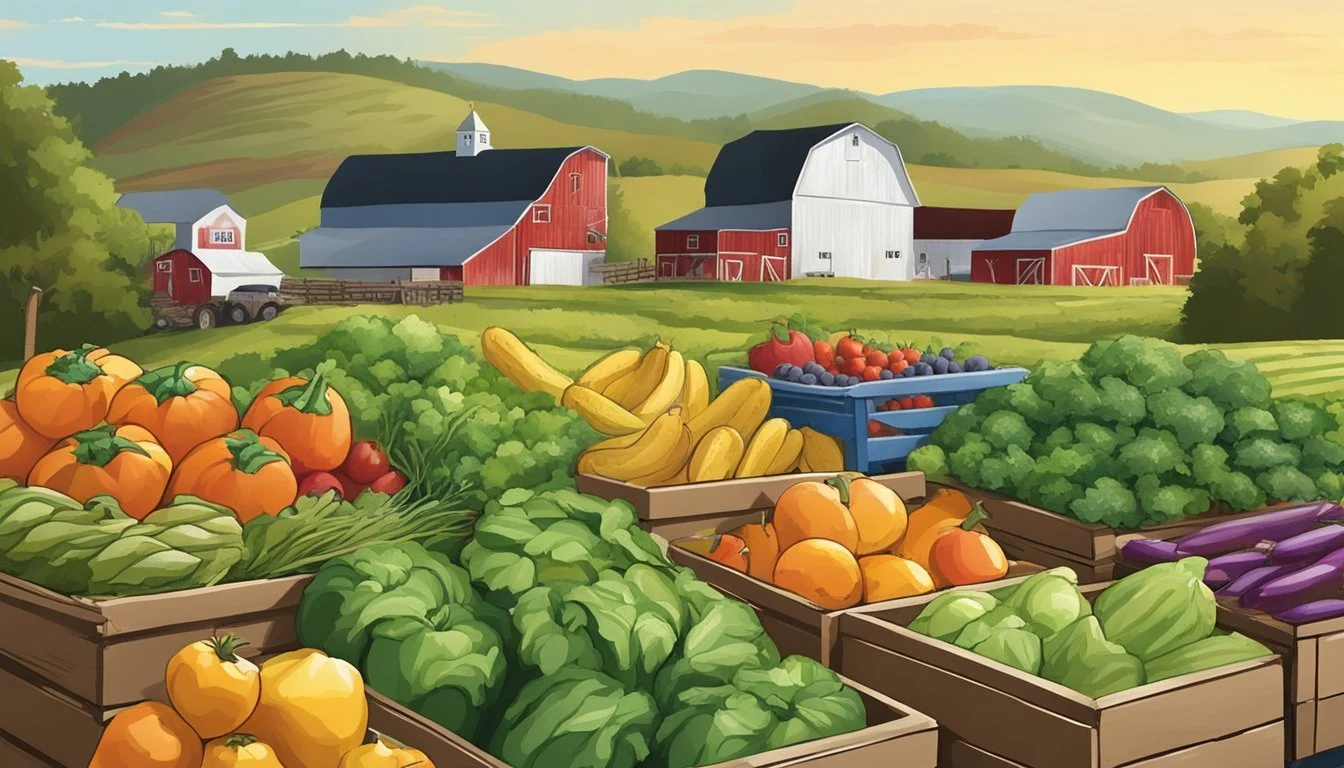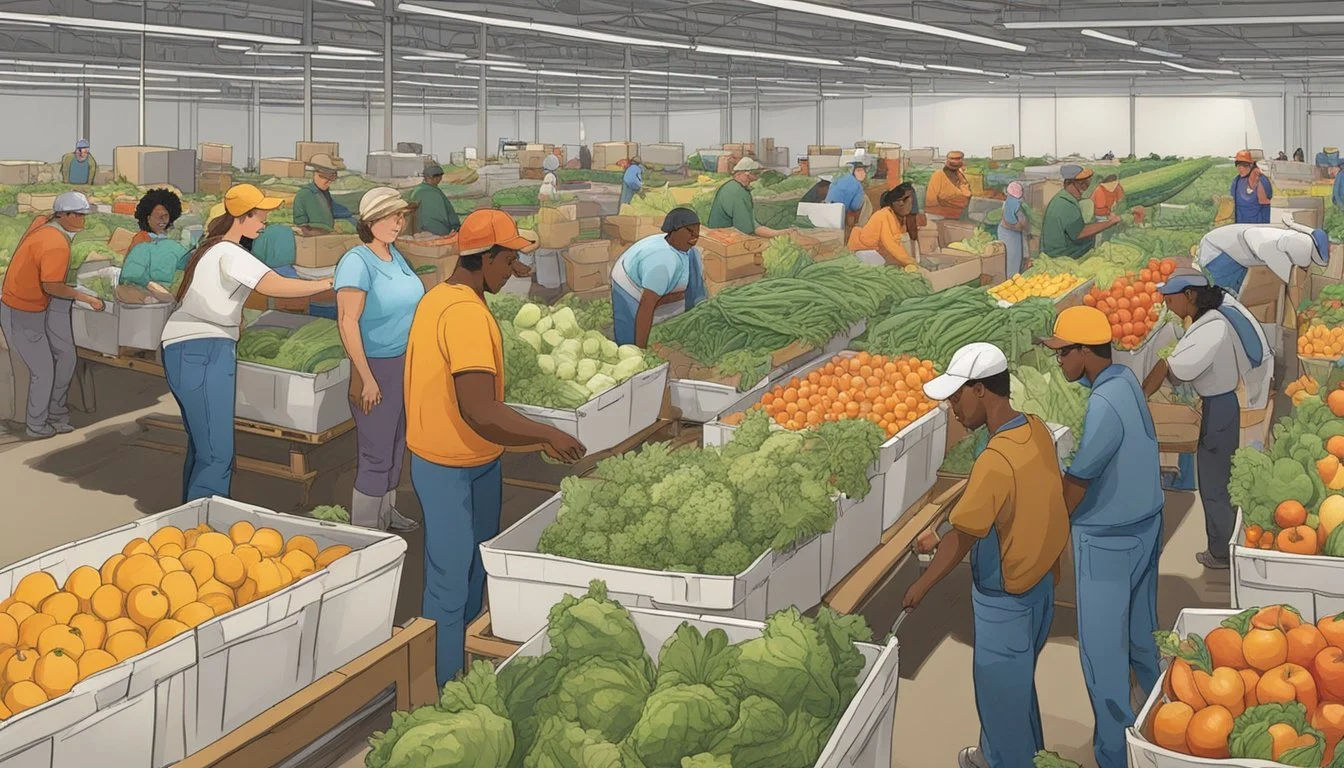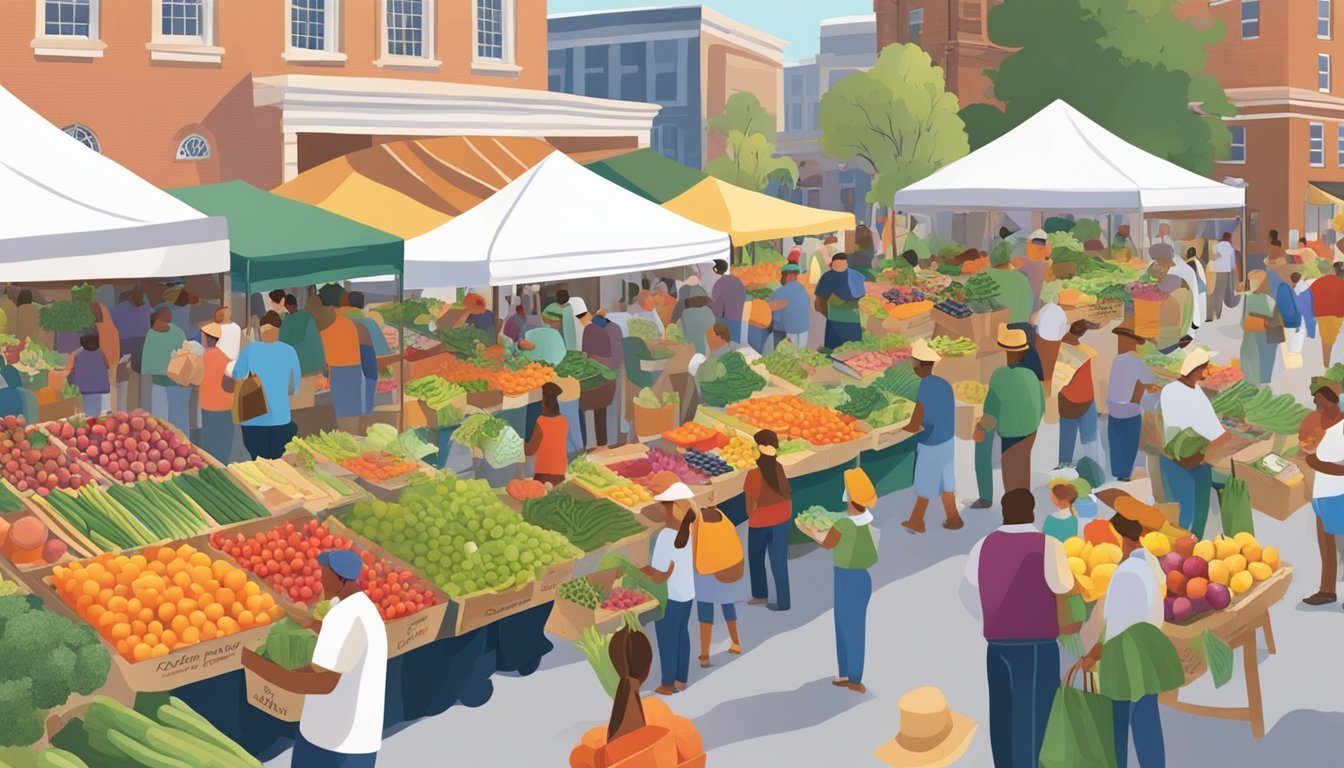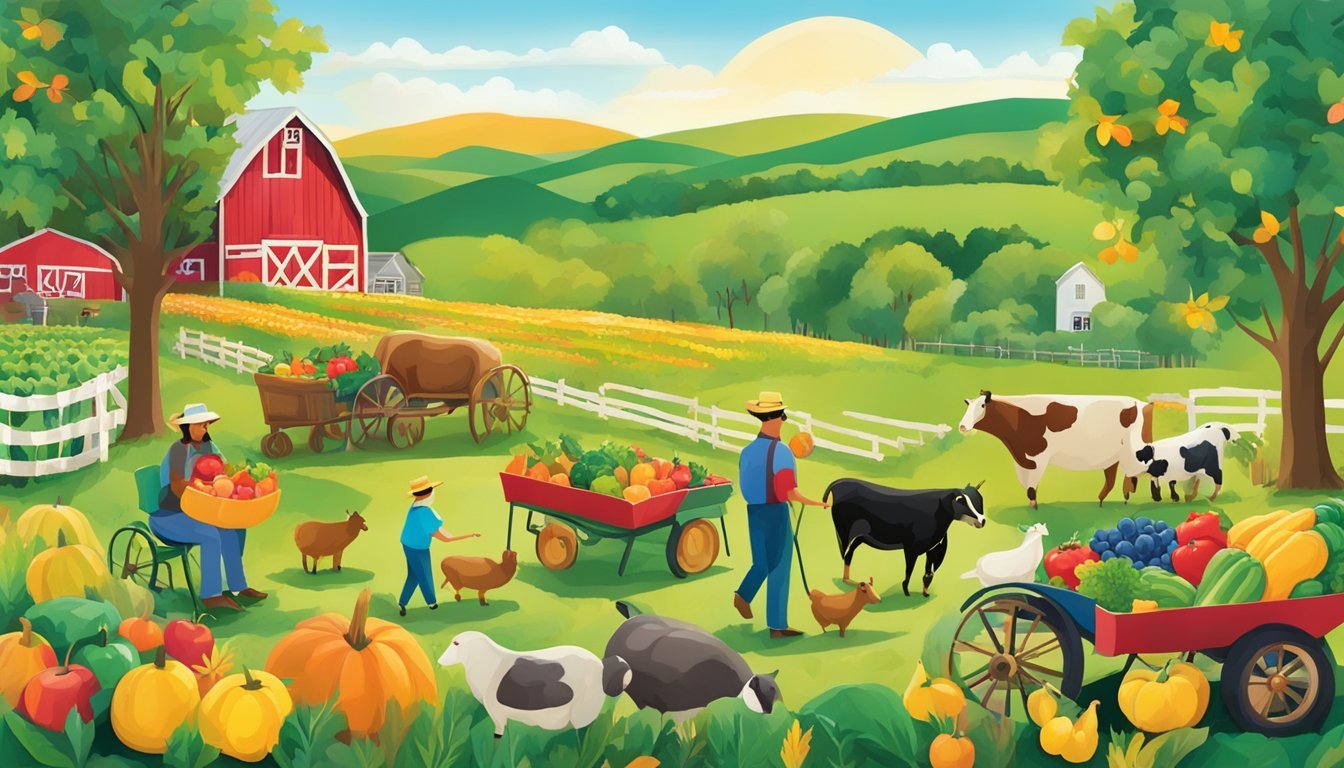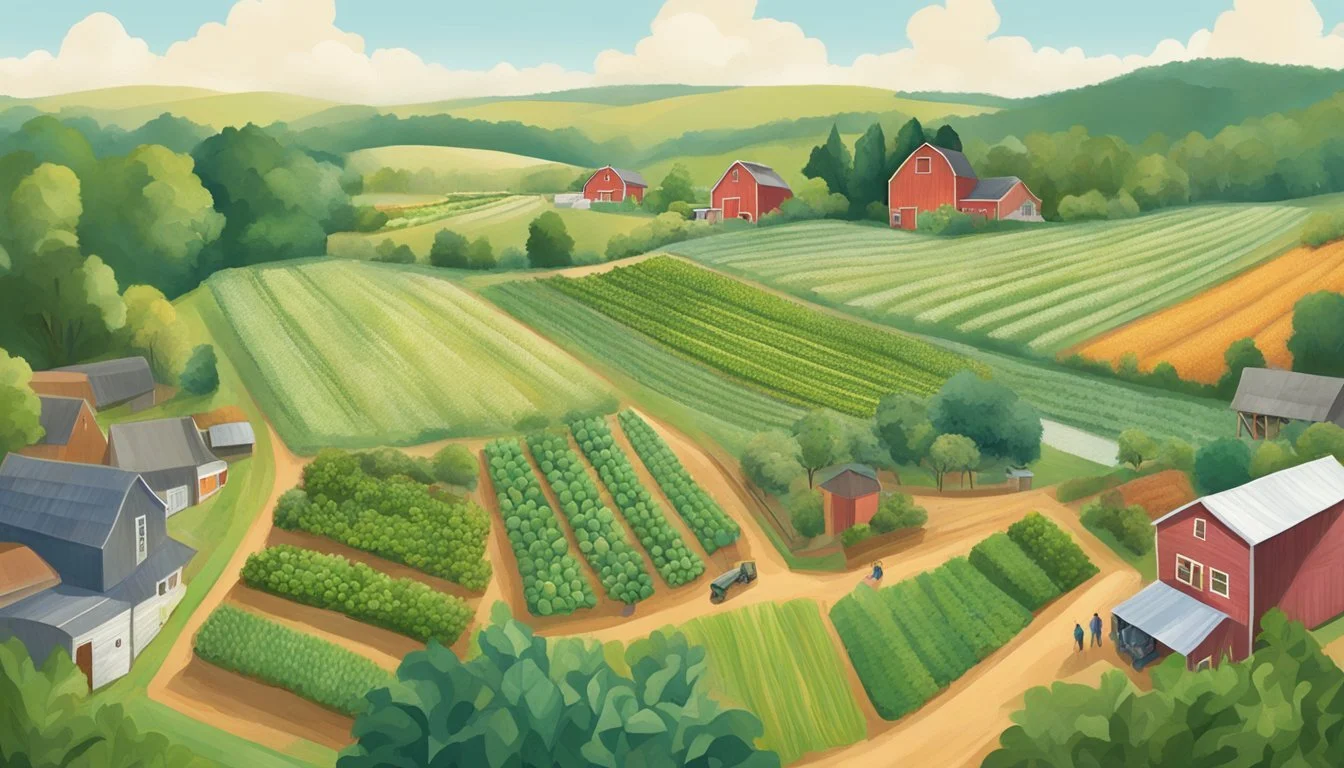Community Supported Agriculture (CSA) in Virginia
Embracing Local Farms and Seasonal Produce
Community Supported Agriculture (CSA) represents a growing movement in Virginia that bolsters the connection between local farmers and surrounding communities. This agricultural model allows consumers to purchase shares from local farms, ensuring they receive a regular supply of fresh, seasonal produce and, in some cases, additional farm products. The concept supports local economies, sustainable farming practices, and provides communities with the freshest food options available, often harvested within miles of their homes.
In Virginia, the CSA model has seen adaptations to meet changing consumer preferences and to take advantage of emerging direct marketing opportunities. Farms have assorted offerings that go beyond traditional vegetables and herbs, often including fruits, berries, melons, flowers, and even eggs. This diversification helps farmers in Virginia cater to a broader audience and aligns their production closer to market demands.
CSAs in Virginia also emphasize the importance of environmental stewardship by reducing food miles and, as a result, greenhouse gas emissions associated with long-distance transportation. By strengthening the direct link between production and consumption, CSAs contribute to a more resilient local food system. Consumers benefit by having a transparent understanding of where and how their food is grown, thus fostering a community spirit rooted in the shared goal of supporting sustainable agriculture.
Understanding CSA
Community Supported Agriculture (CSA) in Virginia exemplifies a growing partnership between farmers and the community, emphasizing local, sustainable food systems. Through a mutually beneficial relationship, it facilitates direct food procurement from producers to consumers.
CSA Concept and Principles
The CSA model is fundamentally about sharing. It's a partnership where consumers invest in local farms at the beginning of the growing season and subsequently receive a portion of the harvest throughout the season. This advance funding helps farmers with the early season financial needs, and in return, CSA members get fresh, often organic, local produce.
Key principles include:
Direct partnerships: between farmers and community members.
Risk sharing: Both parties share the risks of farming, including poor harvests due to adverse weather.
Local production and consumption: Encouraging sustainable agricultural practices and reducing food miles.
History of CSA in Virginia
CSA in Virginia has traversed a journey of adaptation and growth. In response to changing consumer preferences and to remain economically viable, Virginian farmers have tailored their CSA models across various scales and practices.
Historical snapshots:
Early adoption: Virginia saw the introduction of CSA models over 25 years ago, aligning with a global movement toward sustainable agriculture.
Evolution: Over time, CSAs in Virginia have diversified their offerings beyond vegetables to include items such as herbs, berries, flowers, and eggs.
Farmers and communities in Virginia have continuously worked together to ensure CSA models evolve with the changing needs and preferences of both producers and consumers within the state.
How CSAs Work
Community Supported Agriculture (CSA) programs in Virginia are structured around members who subscribe to a local farm's harvest. These subscriptions facilitate a symbiotic relationship where members receive fresh, seasonal produce directly from their local farms, ensuring their access to quality products while supporting the local agricultural economy.
Membership and Subscription
Memberships in CSA programs involve subscribers purchasing a share of the anticipated harvest from a local farm. A typical subscription process begins as early as January and can continue until May, with most farms offering memberships for 22 to 26 weeks during the peak of summer through fall. It is common for some farms in Virginia to provide flexible subscriptions that might include winter and spring shares catering to off-season demands.
Enrollment: The engagement period when new and returning members sign up
Financial Commitment: Members pay upfront for their share of the harvest.
Shares and Deliveries
The shares offered by CSAs consist of a portion of the farm's harvest which is often delivered weekly or bi-weekly to various pickup locations or directly to members’ homes. The composition of these shares typically includes a variety of fresh and seasonal vegetables and, in some cases, fruits, meats, and other farm products.
Share Contents: Fresh, seasonal produce forming the bulk of deliveries.
Delivery Schedule: Regular intervals, such as weekly/bi-weekly during active seasons.
Pickup Locations: Over 30 designated spots across regions like Northern Virginia or direct home delivery.
Harvest Time: Timing of shares coinciding with peak harvest periods.
Benefits of CSA
Community Supported Agriculture (CSA) in Virginia presents a framework that creates a symbiotic relationship between consumers and local farms. The benefits range from providing fresh, locally sourced produce to consumers, to financial and operational support for farmers, and extend to notable environmental advantages.
Advantages for Consumers
Consumers benefit from CSAs as they gain access to fresh produce that is often organically grown, enhancing their diet with nutritious, seasonal food. By subscribing to CSAs, they:
Enjoy higher-quality food with better taste and nutrition.
Have the opportunity to learn about seasonal eating and cooking with fresh ingredients.
Strengthen the local economy by supporting Virginia farmers.
Advantages for Farmers
Farmers participating in CSA programs receive significant advantages including:
Predictable income from pre-season payments that aid with cash flow.
A reduction in marketing costs as they directly sell to the community.
Fostering closer relationships with consumers, which can lead to a loyal customer base.
Environmental Benefits
The CSA model offers environmental benefits that include:
Reduction in greenhouse gas emissions due to minimized transportation distances.
Lower carbon footprint compared to conventional agriculture practices.
Support for organic farms, which often employ practices that are better for soil health and biodiversity.
This sustainable approach to agriculture emphasizes the importance of local food systems in building stronger communities and promoting environmental stewardship.
Challenges of CSA
Community Supported Agriculture (CSA) in Virginia is a promising model for food production and community engagement. However, it faces several operational and seasonal challenges that affect both farmers and subscribers.
Operational Challenges
Managing Subscriptions: CSAs rely on a subscription-based model, where customers pay in advance for a share of the harvest. This arrangement requires careful management of customer expectations and consistent communication. Farmers must accurately predict crop yields to meet the commitments made to subscribers without overproducing, which could lead to waste.
Distribution Logistics: Efficient distribution is crucial for CSAs in Virginia. Farmers must develop a reliable system for delivering fresh produce to subscribers, often involving multiple drop-off points or pick-up locations. They need to balance this with maintaining the quality and freshness of their produce, which can be a logistical challenge.
Seasonal Variability
Climatic Impacts: Farmers are subject to the whims of nature, which can bring about unpredictable weather patterns affecting crop yields. CSA farmers need to plan for such variability and have contingency plans in place.
Crop Diversity: To maintain subscriber interest throughout the season and ensure a more predictable income, it is important for CSAs to offer a diverse range of products. However, sustaining this diversity can be demanding as it requires detailed knowledge of seasonal crop suitability and meticulous planning.
CSA Products
Community Supported Agriculture in Virginia offers a rich array of fresh, local products directly from the farm to the consumer's table. These offerings range from the common to the unique, embracing both tradition and innovation in agricultural production.
Typical CSA Offerings
Virginia CSA farms provide a diverse selection of produce that commonly includes a variety of vegetables such as tomatoes, bell peppers, cucumbers, and leafy greens. In addition, subscribers can expect a range of berries, with strawberries often being a seasonal favorite. Many CSA programs also feature farm-fresh eggs, an assortment of flowers to brighten homes, and a variety of herbs for culinary use.
Vegetables
Tomatoes
Bell peppers
Cucumbers
Leafy greens
Berries
Strawberries
Blueberries
Raspberries
Additional Offerings
Fresh Eggs
A variety of Herbs
Cut Flowers
The inclusion of specialty items like local cheese and pastured meats is not uncommon, enabling supporters to enjoy a more comprehensive taste of Virginia's agrarian bounty.
Organic and Heirloom Varieties
CSAs in Virginia take pride in providing not just conventional produce but also a selection of organic vegetables. These are grown without synthetic pesticides or fertilizers, ensuring a pure, environmentally conscious choice for consumers. The presence of heirloom vegetable varieties is a testament to the agricultural heritage of the region, offering flavors and textures that have been cherished for generations. These heirloom varieties promote biodiversity and give CSA members the chance to experience a unique piece of the area's farming history.
Organic Vegetables
Lettuce
Spinach
Carrots
Heirloom Varieties
Brandywine Tomatoes
Dragon Carrots
Moon and Stars Watermelon
Chioggia Beets
The products provided through CSA reflect the seasonality and sustainable practices of Virginia's small-scale farms, allowing members to support local agriculture while enjoying premium quality and taste.
Finding a CSA in Virginia
The search for a Community Supported Agriculture (CSA) program in Virginia can connect consumers with an abundance of fresh, seasonal produce. Residents have various options ranging from small-scale local farms to CSA models adapted to changing consumer preferences.
Local CSA Directories
To locate a CSA in Virginia, potential subscribers should utilize directories like LocalHarvest, which lists CSA programs like Gathering Springs Farm in Northern Virginia. This directory provides information for farms such as those in Bluemont and Woodbine, Maryland, which emphasize produce sourced within a 100-mile radius to ensure freshness and support for local farmers. Farmers markets, often featuring stands from local CSAs, are another resource-rich environment for those interested in seasonal offerings.
Seasonal Availability
In Virginia, CSAs operate on a seasonal schedule, with many running two primary seasons. For example, Sophia's Pantry CSA offers its services from mid-May to mid-August and from early September to mid-December. Facilities like the Virginia Institute of Marine Science provide CSA produce pickup locations, ensuring that subscribers have convenient access to their shares. The seasonal approach allows CSAs to provide not only vegetables but also fruits, herbs, and eggs at their peak freshness.
Tips for CSA Members
When joining a Community Supported Agriculture (CSA) program in Virginia, members embark on a food-centric partnership with local farms. Here are some helpful tips to ensure a smooth membership experience:
Understand the Commitment: Members should recognize that CSA is a season-long commitment. By purchasing a share, they support the farm throughout the growing season and in turn receive fresh local produce.
Set Realistic Expectations: The bounties of farm shares vary by season and are subject to weather conditions. Members should not expect the variety of a grocery store, but rather a reflection of the local harvest.
Embrace Variety: CSAs introduce a diverse array of produce to members' diets. Members may find new and unfamiliar vegetables in their shares and should be open to exploring different recipes.
Food Storage Know-How: Learn how to properly store different types of produce to maximize freshness and longevity. For instance, leafy greens often require refrigeration, while root vegetables may last longer in a cool, dark place.
Community Engagement: Engage with the community aspect of CSA. Many CSAs offer opportunities for members to visit the farm, meet the farmers, and understand the agricultural process.
Share Feedback: Constructive feedback is vital. Members should communicate with farmers about the share's content, pickup logistics, and other concerns to help improve the CSA experience.
Processing Surplus: At times, shares might be abundant. Members can preserve surplus through freezing, canning, or sharing with neighbors, integrating a sustainable practice into their membership.
By adhering to these recommendations, CSA members can enhance their appreciation for local food, support sustainable agriculture, and become more ingrained in their local food community.
Direct Marketing Strategies for CSA Farms
Direct marketing strategies are essential for Community Supported Agriculture (CSA) farms to build a strong relationship with the community and ensure sustainability. By leveraging local engagement and online marketing, CSA farms can attract and retain members committed to supporting local farmers.
Community Engagement
Community engagement is instrumental for CSA farms in Virginia to maintain direct marketing success. By creating partnerships with local businesses, CSA farms can gain exposure and establish a presence at community events such as farmers markets. Hosting farm-to-table events and offering farm tours can strengthen ties with community members, who appreciate transparency and the ability to connect with where their food comes from.
Farm Tours: A direct way to show consumers the farming process.
Local Partnerships: Collaborations with local businesses to promote the CSA.
Farmers Markets: Regular participation to maintain visibility and build consumer trust.
Online Marketing
Effective online marketing allows CSA farms to reach a wider audience while preserving the traditional values central to CSA's ethos. A user-friendly website with clear communication of offerings, and a streamlined sign-up process are core elements. Furthermore, strategic use of social media platforms can create a virtual community around the farm's activities and values.
Website Essentials:
Easy navigation
Sign-up options
Clear display of produce and share details
Social Media Strategy:
Regular updates on harvests and farm news
Engagement with followers
Highlighting the significance of supporting local farmers
CSA Events Calendar
Community Supported Agriculture (CSA) programs in Virginia offer a rich calendar of events and sign-up opportunities throughout the year. They provide community members with a chance to engage with local farms and secure shares of fresh produce.
Periodic Events
November: The end of the farm season often includes harvest celebrations and member appreciation events where shareholders can experience the farm community up close.
January: Often quiet, this month may feature planning sessions for the upcoming year and volunteer opportunities for those wishing to be involved.
Sign-Up Windows
February: The month when many CSAs begin accepting new members for the upcoming season. Interested individuals should monitor specific CSA websites for exact dates.
Shares: Availability and pricing of shares are typically announced during this window. Potential subscribers must act quickly as shares can be limited.
Legislation and Regulations Affecting CSA
Community Supported Agriculture (CSA) in Virginia operates within the framework of various local laws and food safety standards. These regulations are pivotal for the effective functioning and management of CSAs.
Local Laws
Local laws determine the operational scope of CSAs within Virginia. Zoning ordinances play a significant role, as they define where agricultural activities can take place and often contain specific stipulations for CSAs. For instance, some regions may have land-use restrictions that impact the distribution and public engagement activities of CSA farms. Following these ordinances, CSA providers ensure compliance and maintain good standing within their communities.
Food Safety Standards
Food safety is paramount for CSAs and is governed by federal, state, and local regulations. In Virginia, CSA operations must adhere to the Virginia Food Laws and Regulations, which include safety protocols from harvest to distribution. These standards serve to ensure that:
Produce Handling is done in a manner that prevents contamination.
Staff Training on proper hygiene and handling techniques is conducted regularly.
Moreover, CSA programs may be subject to inspections by the Virginia Department of Agriculture and Consumer Services (VDACS), which enforces food safety standards to protect consumers.
Virginia CSAs are also influenced by the Food Safety Modernization Act (FSMA) at the federal level, specifically through the Produce Safety Rule, which sets standards for the safe growing, harvesting, packing, and holding of fruits and vegetables sold fresh. Compliance with these standards is critical for CSA operations and contributes to the trust and safety valued by their communities.
Future of CSA in Virginia
The agricultural landscape in Virginia is witnessing a significant shift towards Community Supported Agriculture (CSA). This model has garnered a steadfast commitment from both local farmers and the community, fostering a symbiotic relationship enhancing organic farm practices and strengthening local food systems.
Trends and Growth Projections
CSA in Virginia is experiencing a noteworthy transition as more consumers seek direct connections with food producers. Growth projections are optimistic, with CSAs becoming increasingly prevalent among Virginia communities. They are seen as a viable alternative to traditional grocery shopping, offering fresher options and a direct link to organic produce. Advancements in direct marketing strategies and the adoption of diverse CSA business models suggest that the reach and influence of CSAs will continue to expand.
Data from the United States Department of Agriculture (USDA) shows that, nationwide, farms participating in CSA arrangements accounted for a substantial portion of direct-to-consumer sales. This trend is expected to follow an upward trajectory in Virginia as well, particularly with the ongoing support from institutions like the Virginia Institute of Marine Science and sustainable agriculture programs ensuring a steady growth rate.
Innovation in CSA Farming
Innovation is at the forefront of CSA operations. Virginia's CSA farmers are not only diversifying their crop offerings but also implementing new technologies and sustainable practices to meet consumer demand and maintain a competitive edge. They are adopting models that allow for increased flexibility in subscription services and deliver a wide variety of vegetables, herbs, berries, and other farm products.
The integration of online platforms for order management and community engagement is revolutionizing the CSA experience. Farmers are utilizing these platforms to communicate directly with their subscribers, providing transparency and enhancing trust within the community. These digital advancements help in managing risks more effectively and in optimizing distribution, proving vital for the sustainability and scalability of CSA models.
Virginia's CSAs embody an evolving fusion of tradition with innovation, poised to redefine the state's agriculture and community relationships for years to come.


